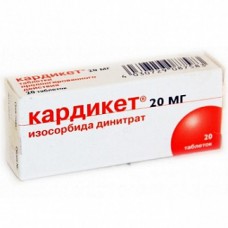Expiration date: 01/2026
Composition and form of release:
Tablets of prolonged action. 1 tablet contains:
isosorbide dinitrate 20, 40 or 60 mg
excipients: lactose monohydrate talc magnesium stearate polyvinyl acetate potato starch
in the blister 10 PCs. there are 2 or 5 blisters in a box.
Description pharmaceutical form:
Tablet 20 mg: round white pill, one side flat, bevelled and scored and engraved: above the line — "IR", under mark — "20" on the other hand, convex, engraved "SCHWARZ PHARMA".
Tablet 40 mg: a round white pill, one side flat, bevelled and scored and engraved: above the line — "IR", under mark — "40" on the other hand, convex, engraved "SCHWARZ PHARMA".
Tablets 60 mg round white pill, one side flat, bevelled and scored and engraved: above the line — "IR", under mark — "60" on the other hand, convex, engraved "SCHWARZ PHARMA".
Pharmacokinetics:
With oral administration of isosorbide, dinitrate is rapidly absorbed. Oral bioavailability-22% (the effect of "first pass" through the liver). The onset of action-in 15-30 minutes, Cmax of the substance in the blood plasma is reached in 15 minutes-1-2 hours. As a result of isosorbide passing through the liver, dinitrate is metabolized to form isosorbide-2-Mononitrate and isosorbide-5-Mononitrate, which have T1/2 1, 5-2 and 4-6 hours, respectively. Both metabolites are pharmacologically active. It is excreted by the kidneys (almost completely in the form of metabolites). Binding to plasma proteins — 30%.
Description of the pharmacological action:
Isosorbide dinitrate causes relaxation of the smooth muscle wall of blood vessels, thus inducing vasodilation. Isosorbide dinitrate acts as a peripheral vasodilator, affecting both arteries and veins. These effects contribute to the deposition of venous blood and reduce venous return to the heart, reducing the final DAP and the volume of the left ventricle (reduce preload).
A prolonged-action card is characterized by a combination of rapid onset of effect with duration of action.
The advantages of the drug are determined by the fact that the active substance contained in a prolonged-action cardiket tablet is rapidly entering the bloodstream. As a result, the drug provides a rapid onset of effect in the treatment of angina and retains its protective effect for a long time.
Indications:
- long-term treatment of CHD: prevention of angina attacks
- secondary prevention of myocardial infarction and treatment for persistent angina (as part of combined therapy)
- chronic heart failure (in combination therapy with cardiac glycosides, ACE inhibitors and / or diuretics).
Contraindications:
- hypersensitivity to nitrates
- acute myocardial infarction with severe arterial hypotension
- acute vascular failure (shock, vascular collapse)
- severe arterial hypotension (sad <90 mm Hg)
- closed-angle glaucoma with high intraocular pressure
- traumatic brain injury
- severe aortic and / or mitral stenosis
- hypovolemia
- hemorrhagic stroke
- age up to 18 years (efficacy and safety of use have not been established)
- simultaneous administration of phosphodiesterase 5 inhibitors (such as sildenafil, vardenafil or tadalafil), since they potentiate the hypotensive effect of nitrates.
Relative contraindications:
- heart tamponade
- hypertrophic obstructive cardiomyopathy (possible increase in angina attacks)
- severe anemia
- constrictive pericarditis
- brain hemorrhage
- toxic pulmonary edema.
Especially careful medical supervision is necessary for diseases such as:
- propensity to disorders of blood circulation regulation due to low blood PRESSURE (orthostatic disorders of blood circulation regulation)
- diseases that are accompanied by increased intracranial pressure
- severe liver and / or kidney failure
- hyperthyroidism.
Use during pregnancy and lactation:
Use during pregnancy and breast-feeding is only possible if the intended benefit to the mother exceeds the possible risk to the fetus and/or child.
Side effect:
At the beginning of treatment, a headache ("nitrate" headache) may develop, which usually disappears after a few days with further use of the drug.
Sometimes when the first use or when increasing the dose of the drug-a marked decrease in blood PRESSURE, especially when the patient gets out of bed, which may be accompanied by tachycardia (possible and paradoxical bradycardia), inhibition, as well as dizziness and a sense of weakness.
Rarely — nausea, vomiting, belching, dry mouth, abdominal pain, as well as redness of the face and allergic skin reactions. In rare cases, with a marked decrease in blood PRESSURE, there is an increase in the symptoms of angina ("paradoxical" increase in angina attacks).
Very rarely — collaptoid States, sometimes with bradycardia and sudden loss of consciousness (syncope).
In some cases, exfoliative dermatitis may appear.
It is possible to develop tolerance (including cross-resistance to other nitrates).
Drug interaction:
It is possible to increase the hypotensive effect of prolonged-acting Cardiket when used simultaneously with other vasodilators (vasodilators), hypotensive drugs, beta-blockers, "slow" calcium channel blockers, phosphodiesterase 5 inhibitors used for the treatment of erectile dysfunction, neuroleptics and tricyclic antidepressants, novocainamide, quinidine, and ethanol.
Simultaneous use of a prolonged-acting Cardiket with dihydroergotamine may lead to an increase in the concentration of dihydroergotamine in the blood and, thus, increase its hypotensive effect. With the simultaneous use of sympathomimetic agents, it is possible to reduce the antianginal effect of the drug Cardiket prolonged action.
Dosage and administration:
Inside, regardless of food intake, without chewing and drinking a small amount of liquid.
In the absence of other recommendations, a prolonged-action card Is accepted as follows:
Extended-acting cardiquet 20 mg: 1 table. 2 times a day. If the therapeutic effect is insufficient, the dose can be increased to 1 table. 3 times a day.
Prolonged-acting cardiquet 40 mg: at the beginning of treatment-1 table. 1 time a day or 1/2 table. 2 times a day. If the therapeutic effect is insufficient, the dose can be increased to 1 table. 2 times a day. To maintain the therapeutic effect at a dosage of 1 table. 2 times a day, the second tablet should be taken no later than 8 hours after the first.
Prolonged-action cardiket 60 mg: at the beginning of treatment - 1 table. 1 time a day. If necessary, the dose can be increased to 1 table. 2 times a day. To maintain the therapeutic effect at a dosage of 1 table. 2 times a day, the second tablet is recommended to take no later than 8 hours after the first.
In order to divide the tablet in half, you need to put it on a hard surface with a fault line up and press your thumb on the tablet. It will easily split into two halves.
Treatment should start with the lowest doses and slowly increase the dose to the maximum effective dose. The decision on the duration of treatment is made by the doctor. This drug is intended for long-term use and without consulting a doctor, you can not abruptly stop taking it.
Overdose:
Symptoms: a marked decrease in blood PRESSURE, collapse, fainting, headache, dizziness, palpitations, visual disturbances, skin hyperemia, perspiration, nausea, vomiting, diarrhea, methemoglobinemia (cyanosis, anoxia), hyperpnoea, dyspnoea, bradycardia, cranial hypertension, paralysis, coma.
Treatment: gastric lavage for methemoglobinemia-in / in 1% solution of methylene blue, 1-2 mg/kg. Symptomatic therapy (epinephrine and related compounds are ineffective).
Special instructions:
Cardiket the prolonged action is not applicable for the relief of angina! During treatment, blood PRESSURE and heart rate must be monitored. With constant continuous treatment using high dosages of prolonged-acting Cardiket, it is possible to develop tolerance, as well as the appearance of cross-tolerance to other drugs of the nitrate group. To prevent a decrease in the effectiveness of the drug Cardiket prolonged action should avoid constant use of high dosages. When taking a prolonged-acting Cardiket, patients with primary pulmonary diseases may experience temporary hypoxemia due to the relative redistribution of blood flow to hypoventilated alveolar zones. In patients with CHD, this can lead to transient myocardial ischemia. During treatment with the drug, alcohol consumption should be excluded.
Influence on the ability to drive vehicles
During the period of Cardiket therapy, it is necessary to refrain from driving vehicles and engaging in potentially dangerous activities that require increased concentration and speed of psychomotor reactions.


